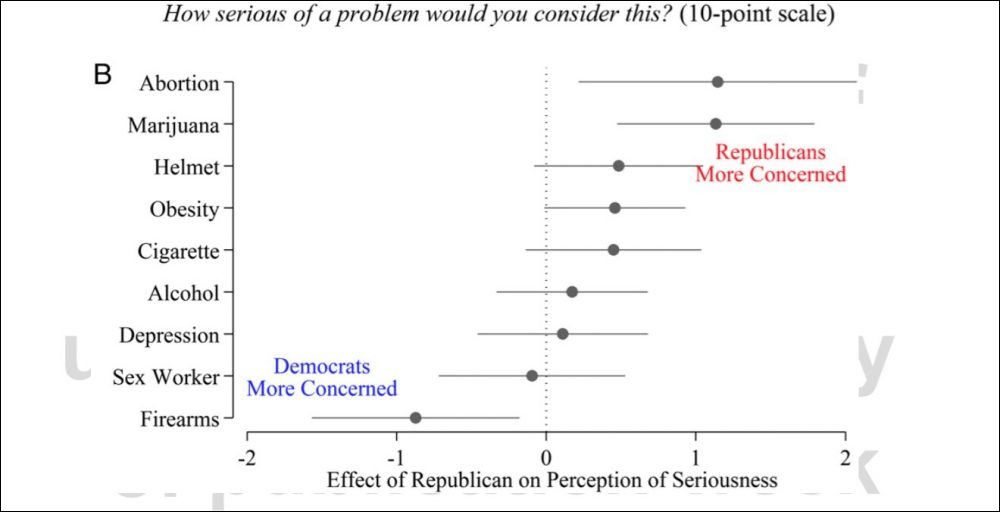Advertisement
Red And Blue Doctors: Politics Can Seep Into Primary Care, Study Finds
Does it matter if your doctor is a Democrat or a Republican? A new study finds that on certain, politicized health issues — abortion, marijuana use, gun safety — the answer may be yes. You may get different counsel and treatment recommendations depending on your doctor's political leanings.
The study, just out in the journal PNAS, surveyed primary care doctors about how they would treat various patients, without revealing the political focus of the study. It also checked voter registration records for their party affiliations.
The upshot, says Eitan Hersh, an assistant professor of political science at Yale University and lead author of the study: On politicized health issues, "Republican and Democratic doctors treat the patients very differently. They recommend different treatment plans and take the issue more or less seriously, depending on their party affiliation."
Say you're a patient who's had two elective abortions. "Republican physicians are much more likely to say that they would discuss the mental health aspects of abortion, to recommend that the patient not have any more abortions," Hersh says. "On marijuana, the Republican physicians are much more likely to discuss the health risks than the legal risks of marijuana, and urge the patient to stop."

Edited excerpts of our conversation:
So abortion, marijuana — other examples?
One very interesting example on guns: We said to doctors, 'Here’s a scenario. There’s a patient who has young children in their home, and they store guns in their home. How concerning is this on a 10-point scale?' And the Democratic physicians say they’re much more concerned about the scenario than Republicans are.
On the other hand, when we start asking what they would do in this scenario, the Republicans are more likely to discuss safe storage practices. So there’s an interesting situation where the Democrats are concerned about it, they’re urging the patient not to store firearms in the home, but, maybe because they’re less familiar with the issues, they’re not saying they would discuss safe storage.
On marijuana, we offer a vignette about a patient who smokes marijuana a couple times a week but is otherwise healthy. The Republican doctors are much more concerned about it, much more likely to say that the patient should stop using marijuana, much more likely to discuss the health and legal risks.
I'd like to point out that, both on this issue and the gun issue, it’s not clear which party is right or wrong. It’s just that the differences themselves are fascinating, and they suggest that the care is going to be different on these issues.
And of course, this [study] is just the first step. Think of all the issues that touch on politics. We think of end-of-life care, we think of LGBT health, lots of sexual and reproductive health issues. Given these results, we would expect that patients are given different care depending on their practitioner.
Is this study a 'first'?
There are many studies about how implicit racial bias or gender bias might affect the patient-physician relationship. This is the first study that looks at the politics of physicians as an explanatory factor in the care that they provide. And we’re hoping it’s the first of many.
What we’ve done is particularly exciting because most of what we’ve done is just link public records together: public records about who physicians are and where they practice, and then the voter registration records, which are public, that identify the party affiliation.
Of course, we can talk about why that might be a scary thing to do — link all these public records — or raise privacy concerns or other concerns. But from the research perspective, what it does is allow us to connect these data, not just to the survey but to reimbursements and referrals, all sorts of information about how doctors are engaging with their patients.
This takes you beyond the scope of the study, but what does it make you think about what patients can or should do?
Hopefully, the main takeaway from this research is that doctors in training and education think about this the way that they’re starting to think about, say, racial bias.
On the patient side, for patients with immediate health issues that touch on politically sensitive areas — like LGBT health, reproductive health, end-of-life care, medical marijuana — what our study suggests is that they might need to think about who their practitioner is and what kind of care they’re going to get.
Our data and our evidence are suggesting that if patients had the signals of a party affiliation of their doctor, they might infer something about what that means in terms of the care they’re going to get on these politicized issues.
When we talk about this research, people have really fascinating stories about the kinds of treatment they’ve gotten that they think has been affected this way. We’ve had religious, pro-life patients who feel like they’ve been pushed too much to do prenatal testing. We’ve had examples of people feeling very uncomfortable talking to OBs about a sexual history that they think they’re going to be judged about. We've had examples of patients who switch primary care providers because their provider is not comfortable with medical marijuana. So there is really just a large range of issues that fall into this category.
But if a patient is doctor-shopping and wants to check a doctor's political leanings, there's no easy way to do it...
Typically, we see people just going through the list of available primary care providers and just looking at the data available, which is the medical school, the gender, the picture on the website. I’m not saying the right thing to do is for me to make a website where everyone can look up their doctor’s politics — but I’m not sure that’s the wrong thing to do either.
Readers? Should there be such a website? Would you use it?
